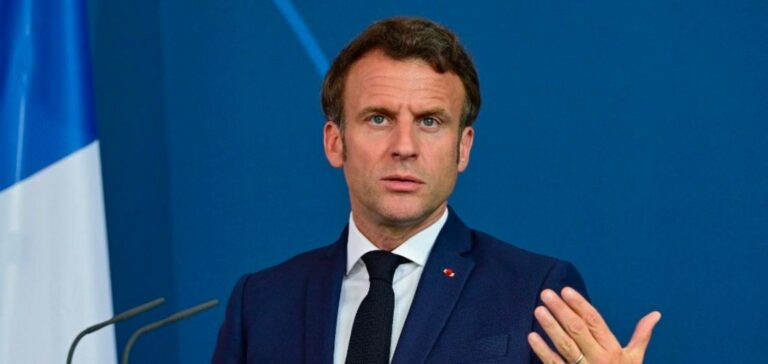Emmanuel Macron inaugurates on Thursday off Saint-Nazaire the very first of a series of offshore wind farms, whose deployment he intends to accelerate in the face of the energy crisis.
“This is the beginning of the road, a first step towards the massive development of renewable energy”,
With a watchword, to reinforce the “energy sovereignty” of France, in full flight of the prices of hydrocarbons and in front of the risks of shortage bound to the war in Ukraine, and to reduce the big delay of the country in the renewables with regard to its neighbors.
The Head of State will visit the site of 80 wind turbines, deployed from 12 to 20 km from the coast of Le Pouliguen and Le Croisic, by boat in the morning.
The park, operated by EDF, will be fully operational by the end of the year. It will then have a power of 480 megawatts (MW) capable of supplying 700,000 people.
Emmanuel Macron will also visit the Chantiers de l’Atlantique, in Saint-Nazaire, where the wind turbines are assembled before being installed at sea. It will specify the main lines of the bill of “acceleration of renewable energies”, which will be presented Monday in the Council of Ministers.
The text aims to shorten project completion times by simplifying administrative procedures and limiting the length of time it takes to examine appeals filed by environmentalists, fishermen and local residents.
Left hand side of the bar
Today, it takes an average of ten years for an offshore site to come on stream in France, compared to five years in Germany and six years in the UK. For onshore wind power, it’s seven years, twice as long as in Spain or Germany, and photovoltaics is not much better off. With this project, Emmanuel Macron, determined to keep a reformist course at the beginning of his second five-year term, intends to give pledges to the left and to the ecologists, while at the same time focusing on pensions and the environment.
unemployment insurance to the right. The examination of the text is however difficult in the National Assembly, in the absence of absolute majority and in front of an extreme right and certain elected representatives of right-wing wind upright against the wind. The subject had already been invited into the presidential campaign, with the RN candidate Marine Le Pen calling for a halt to projects and the gradual dismantling of existing sites. On February 10 in Belfort, Emmanuel Macron had opted for offshore wind power, with a goal of fifty farms by 2050 for a capacity of 40 gigawatts. To date, seven parks have been awarded to operators: after
In Saint-Nazaire, construction began in Saint-Brieuc, which was the object of friction with the fishermen, Courseulles-sur-Mer and Fécamp.
Subsequently, other calls for tenders were issued, including two in
Mediterranean.
In Oleron, appeals have been filed to push the project further offshore.
The head of state has, however, put the brakes on onshore wind power, with a doubling of the current capacity not over 10 but 30 years. He also announced the revival of nuclear power with the construction of six EPR2 reactors by 2035, and a tenfold increase in installed solar power by 2050.
The prefects mobilized
“The course set in Belfort is more urgent than ever since the outbreak of war in Ukraine on February 24 and in the face of the increasingly tangible damage of climate change, the Elysée insists.
Several NGOs, including France Nature Environnement (FNE), have criticized the provisions of the bill aimed at simplifying procedures. The development of renewables must be done “in compliance with public consultation procedures and environmental law”, they plead. The government finally withdrew one of the criticized articles on Wednesday.
France Energie Eolienne believes that this text can contribute, in the long term, to the installation of renewable energies in the landscape, in particular by reducing the electricity bill for people living near the wind farms, or by planning offshore wind energy by maritime facade for a longer term vision.
But to accelerate in the immediate future, the sector is counting on a recent circular asking prefects to “facilitate the processing” of files. For the last three years, onshore wind developers have seen their authorizations collapse, putting France further away from its objectives.
In a context of tense electricity supply and unavailability of part of the nuclear park, wind, solar and methanization will be until 2025 “the only means to produce megawatt hours more,” argue their representatives.
In 2021, renewables provided 24% of electricity production (hydro, wind, solar, bioenergy), nuclear 69%, and fossil fuels 7%.






















